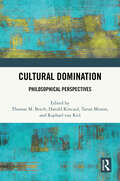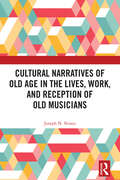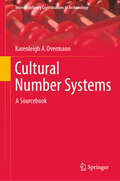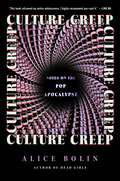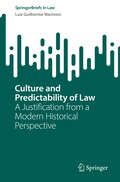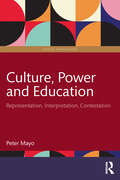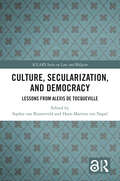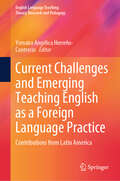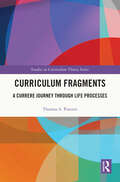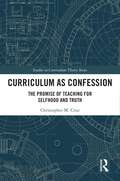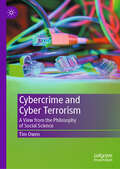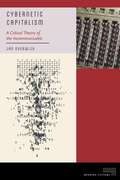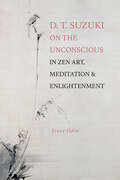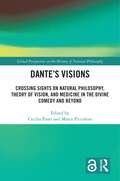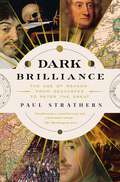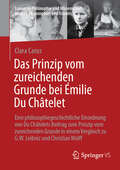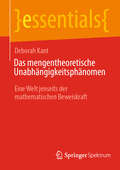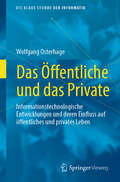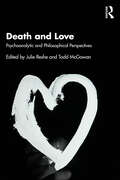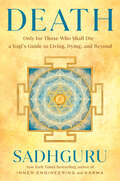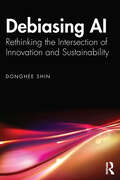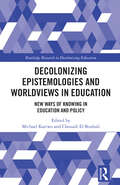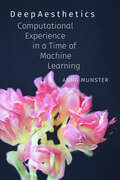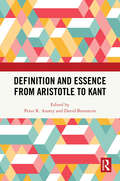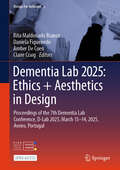- Table View
- List View
Cultural Domination: Philosophical Perspectives
by Harold Kincaid Thomas M. Besch Tarun Menon Raphael RielCultural domination has received attention inside and outside of academia, but it remains under-explored in recent philosophical debate. To fill this gap, this book brings together ten original research contributions that engage the theme from a variety of different perspectives. They range from contributions to the philosophy of social science to advanced work in normative political philosophy. The diversity of approaches reflects the intellectual richness of the theme. Ideas of cultural domination not only raise complex conceptual and methodological questions that can challenge our understandings of domination or culture; such ideas can also play an important role both in explanations of salient social phenomena, such as social structures, and in an evaluation and critique of such phenomena. The diversity of styles of analysis, theoretical commitments, and normative frameworks across the chapters makes this book ideal for advanced undergraduate and graduate students looking for an entry point into this complex issue, as well as for scholars in philosophy, social science, and cultural studies interested in the current state of the art.
Cultural Narratives of Old Age in the Lives, Work, and Reception of Old Musicians
by Joseph StrausOperating largely within the world of European-American classical music, this book discusses the creative work of old musicians—composers, performers, listeners, and scholars—and how those forms of music- making are received and understood. Like everything else about old age, music-making is usually understood as a decline from a former height, a deficiency with respect to a youthful standard. Against this ageist mythology, this book argues that composing oldly, performing oldly, and listening oldly are distinctive and valuable ways of making music—a difference, not a deficit; to be celebrated, not ignored or condemned.Instead of the usual biomedical or gerontological understanding of old age, with its focus on bodily, cognitive, and sensory decline, this book follows Age Studies in seeing old age through a cultural lens, as something created and understood in culture. This book seeks to identify the ways that old musicians (composers, performers, listeners, and scholars) accept, resist, adapt, and transform the cultural scripts for the performance of old age. Musicking oldly (making music in old age) often represents an attempt to rewrite ageist cultural scripts and to find ways of flourishing musically in a largely hostile landscape.
Cultural Number Systems: A Sourcebook (Interdisciplinary Contributions to Archaeology)
by Karenleigh A. OvermannThis sourcebook presents an extensive look at cultural number systems in numeracy and writing systems. Based on a decade of research by the author, the work examines topics such as why Xerxes the First counted his army by having his men march through an enclosure big enough to hold 10,000 of them at a time, why the Hawaiian word for "twenty" means “nine and two,” why an ancient Greek mathematician was driven mad by irrational numbers, and how old counting might be and how we might know this. Along the way, the author describes topics such as dactylonomy, the ancient art of expressing and calculating numbers with the fingers; specified counting, the use of different counting sequences to count different types of objects; and the ephemeral abacus, strategies for counting that involve people and goods but not an actual device. The chapters are organized into six geographical areas (the ancient Near East, Africa, Europe, Asia/India, Oceania, and the Americas).
Culture Creep: Notes on the Pop Apocalypse
by Alice Bolin"This book re-framed my entire adolescence. I highly recommend you read it." — LING MAFrom the critically acclaimed author of Dead Girls (“stylish and inspired”—New York Times Book Review), a sharp, engrossing collection of essays that explore the strange career of popular feminism and steady creep of cults and cult-think into our daily lives.In seven stunning original essays, Alice Bolin turns her gaze to the myriad ways femininity is remixed and reconstructed by the pop culture of the computer age. The unlikely, often insidious forces that drive our popular obsessions are brilliantly cataloged, contextualized, and questioned in a kaleidoscopic style imitating the internet itself.In “The Enumerated Woman,” Bolin investigates how digital diet tracking apps have increasingly transformed our relationships to our bodies. Animal Crossing’s soothing retail therapy is analyzed in “Real Time”—a surprisingly powerful portrait of late capitalism. And in the showstopping “Foundering,” Bolin dissects our buy-in and complicity with mythmaking around iconic founders, from the hubristic fall of Silicon Valley titans, to Enron, Hamilton, and the USA.For readers of Trick Mirror and How to Do Nothing, Culture Creep is a swirl of nostalgia and visions of the future, questioning why, in the face of seismic cultural, political, and technological shifts as disruptive as the internet, we cling to the icons and ideals of the past. Written with her signature blend of the personal and sharply analytical, each of these keen-eyed essays ask us to reckon with our own participation in all manner of popular cults of being, and cults of believing.
Culture and Predictability of Law: A Justification from a Modern Historical Perspective (SpringerBriefs in Law)
by Luiz Guilherme MarinoniThis book aims to identify the sociological reasons that resulted in the perceived lack of authority of precedents in civil law systems, starting from the premise that common law systems rely on precedents, while civil law systems do not. The reasoning is based on the sociology of law, mainly on Max Weber’s theory, legal theory, and constitutional law. English common law, seen by Weber as a law devoid of formal rationality mainly because it does not allow for generalization and comprehensiveness, became a predictable system through stare decisis. This serves to highlight not only that it is not to be confused with common law but especially to clarify that “binding precedents” are necessary as the law moves away from calculability. The transformation of civil law due to the impact of constitutionalism, the increasingly widespread use of general clauses, and the evolution of the theory of interpretation eliminated the pretensions of logical positivism and, consequently, the predictability upon which it would be achievable. However, if the law contemplated by Weber ceased to exist and the new law came to depend largely on the subjectivity of the judge, this does not mean that society could remain helpless and devoid of guarantees of predictability and equality, as the new profile of civil law could not be compatible with a coherent legal order and a rational distribution of justice. In the end, the book seeks to demonstrate the fundamentality of precedent for the unity and development of law, clarity and generality, promotion of equality, institutional strengthening, limitation of state power, predictability, economic rationality, respect for the law, and increased personal responsibility.
Culture, Power and Education: Representation, Interpretation, Contestation (Critical Interventions)
by Peter MayoEmploying Gramscian conceptions of hegemony, this book demonstrates the inextricable links between politics, education, culture and power.Based upon in-depth analyses of the theories of Antonio Gramsci, Lorenzo Milani, Paulo Freire, Henry Giroux, and bell hooks among others, this book shows how many hegemonic social relationships are fundamentally educational relationships. In doing so, Mayo demonstrates how popular culture, education, museums, and fine art are both sites of hegemony and contestation.This thought-provoking work will be of interest to students and scholars with an interest in sociology of art and culture, sociology of education, critical pedagogy, cultural studies, museum studies and social theory.
Culture, Secularization, and Democracy: Lessons from Alexis de Tocqueville (ISSN)
by Sophie van Bijsterveld and Hans-Martien ten NapelFollowing the approach developed by Alexis de Tocqueville, this volume views democracy as a cultural phenomenon. It starts from the assumption that if we are to adequately address concerns about the current state and future of modern Western democracies, we need first to tackle the cultural preconditions necessary for the functioning of a democracy.Since Tocqueville’s time, the book takes the most crucial change in the West to be ‘double secularisation’. Here, this concerns, first, the diminished influence of organised Christianity. Even though secularity was partly a product of Christianity, secularisation is highly significant in terms of the cultural underpinnings of Western democracy. Second, it involves a decreased interest in and knowledge of classical philosophy.Chapters on secularity, family life, civic life, and public spirit focus on central elements of the changed cultural foundation of democracy, exploring issues such as identity politics, the public space, and the role of human rights and natural law in a pluralistic and resilient democracy. The volume concludes with a closer look at the implications of current presentism, that is, the view that only the present counts for the legitimacy and effectiveness of democratic systems. Finally, it asks if double secularisation can also offer fresh opportunities for promoting the conditions of a viable democracy.The book will be of interest to academics and researchers working in the areas of law and religion, constitutional law, political science, history, and philosophy.
Current Challenges and Emerging Teaching English as a Foreign Language Practice: Contributions from Latin America (English Language Teaching: Theory, Research and Pedagogy)
by Yomaira Angélica Herreño-ContrerasThis book brings together contributions on current challenges in Teaching English as a Foreign Language (TEFL) in Latin America. It examines various issues related to two areas within TEFL: first, in-class activities and innovative approaches, focusing on the development of intercultural competence, technology-based teaching and learning practices, grammar learning and digital life and its repercussions in English learning. Second, teacher education and professional development, analyzing aspects such as source-based writing skills, Lingua Franca and World Englishes, post-pandemic face-to-face instruction and literature in English as a Foreign Language (EFL) Teacher Education Programs along with studies on job satisfaction, attrition and professional identity. Specifically, the chapters provide an overview of the EFL teacher and classroom in Latin America, and the demands, benefits and drawbacks observed in this sociocultural context. Each chapter also includes meaningful views from a Latin American context and contributes to the development of better EFL teaching and learning practices worldwide. This book is a useful reference for scholars, researchers, and educators who focus on EFL teaching and learning at any educational level in Latin America. It is also a helpful resource for trainee teachers delving further into their fields.
Curriculum Fragments: A Currere Journey through Life Processes (ISSN)
by Thomas S. PoetterThis book builds upon Louise Berman’s late 20th-century framing of life processes to inform school curriculum, by proposing a new curriculum project that extends and reframes Berman in and beyond schooling.Using the well-established curriculum theorizing method, currere, the author focuses on seven life processes, including knowing, loving, losing, growing, forgiving, relating, and hoping. Each of these is approached using currere-oriented, autobiographical fragments – stories from the author’s own lived experiences in education and life – that illuminate the educational, curricular, and pedagogical possibilities of each of the seven processes using past, present, and future perspectives, which the author calls curriculum fragments. These curriculum fragments are tied to historical and contemporary curriculum theorizing and educational theory and practice, in order to suggest considerations for movement for the reader, scholar, educator, and leader. It ultimately asks whether humanity can create a joyful, beautiful, and just curriculum of life for each and every person through schooling and beyond, and consequently, a better world built on love.Focusing on real-life experiences in school and life that have educational implications and that can inform the curriculum, the field of curriculum studies, and the act of curriculum theorizing, this book will appeal to curriculum scholars interested in using currere, understanding patterns of use, participating in the production of curriculum and educational knowledge in the field, and perceiving and using curriculum theorizing as an integral part of their daily work.
Curriculum as Confession: The Promise of Teaching for Selfhood and Truth (ISSN)
by Christopher M. CruzThis book offers a philosophical inquiry into the idea of curriculum as confession and considers how it can help us answer questions of justice, selfhood, and truth. It connects the field of curriculum studies and continental philosophy in order to arrive at new ways of thinking through the concept and act of confession. Utilising a phenomenological and deconstructive approach to thinking about curriculum, the author draws upon scholars including William Pinar, Jacques Derrida, Madeleine Grumet, and Michel Foucault to act as interlocutors for a re-thinking of Pinar’s statement that “we need educational confession.” The chapters argue that confession communicates the interplay between thinking, translation, and transformation, showing how confession can be conceived of as educative in both instrumental and existential ways. An innovative study that explores confession in both “religious” and “secular” senses, and conceptualises curriculum as a theological and phenomenological text, it uniquely explores what confession can reveal, how we tell the truth without violating the other, and how one does justice to the world they experience. It will appeal to scholarly audiences with interests in curriculum studies, teacher education, philosophy of education, religious studies, religious education, and theology.
Cybercrime and Cyber Terrorism: A View from the Philosophy of Social Science
by Tim OwenThis book examines the cyber terrorist offender through social and biological theories. It critiques how traditional criminology theory falls short when applied to cyber-terrorism. Using a four-fold lens, it takes into analytical consideration a cluster of psychological, social, genetic and neurological variables. It uses multiple examples to show how this approach can be applied to selected aspects of cyber terrorism, including definitions of terrorism per se, forms of cyber terrorism, examples of counter terrorism and attempts to combat cyber terrorism, and the possible motivations for cyber terrorism. This Genetic-Social approach seeks to ‘build bridges’ between the biological and social sciences, providing an ontologically-flexible, more integrationalist conceptualisation of the phenomena of cyber terrorism. It includes a chapter explaining how the post-Covid era has changed the playing field in a way that advantages cyber-terrorists and it also discusses a blueprint for a potential predictive model of cyber terrorism.
Cybernetic Capitalism: A Critical Theory of the Incommunicable (Meaning Systems)
by Jan OverwijkA Conceptual Interrogation of Capital in a Cybernetic Environment Cybernetic Capitalism presents a groundbreaking synthesis of Niklas Luhmann's systems theory and critical theory. Overwijk examines how neoliberal capitalism now thrives on the management of incommunicability rather than the pursuit of total communicability, harnessing ecological complexity as its driving force. Contrary to earlier critiques that highlighted capitalism's push to render all social life fully communicable, the current era encourages market incalculability, profits from user unpredictability, and spurs serviceworkers' creativity.This ecological logic resonates with the extractivist drive of the Anthropocene, reframing our understanding of capitalism as an adaptive, environment-attuned system. Cybernetic Capitalism also exposes how these dynamics intersect with the cultural rise of conspiracy theories and radical-right irrationalism. By illuminating capitalism's paradoxical reliance on both rationalist and irrationalist currents, Overwijk provides a vital new lens for interpreting the complex politics of our time.
D. T. Suzuki on the Unconscious in Zen Art, Meditation, and Enlightenment (SUNY series, Perspectives in Contemplative Studies)
by Steve OdinA comprehensive study of D. T. Suzuki's Zen philosophy and philosophical psychology in relation to his Buddhist understanding of the "cosmic Unconscious."This book explores how the Japanese philosopher D. T. Suzuki (1870–1966) developed an integral synthesis of Eastern and Western sources to establish a modern philosophical psychology of the "cosmic Unconscious," which he in turn used as the basis to interpret every aspect of Zen art, meditation, and enlightenment. Beyond Freud's personal unconscious and Jung's collective unconscious, according to Suzuki, is the cosmic Unconscious of Zen, which as absolute nothingness is the fountain of inexhaustible creative potentialities and the source of all Zen-inspired arts. The book demonstrates that, like the Kyoto School of modern Japanese philosophy, Suzuki's Zen endeavors to overcome the existential problem of nihilism or relative nothingness by shifting to the openness of absolute nothingness wherein emptiness is fullness and all things are disclosed in the evanescent beauty of their suchness. Suzuki, however, formulates his scheme in terms of a depth psychology where the cosmic Unconscious is the encompassing locus of absolute nothingness. Ultimately, the book argues that, by integrating both Eastern and Western views of the unconscious psyche, including the different schools of Zen and Mahayana Buddhism, as well as American, French, and German theories of the unconscious, Suzuki's Zen concept of the cosmic Unconscious constitutes a significant original contribution to philosophical psychology.
Dante’s Visions: Crossing Sights on Natural Philosophy, Theory of Vision, and Medicine in the Divine Comedy and Beyond (Global Perspectives on the History of Natural Philosophy)
by Marco Piccolino Cecilia PantiDante’s Visions: Crossing Sights on Natural Philosophy, Theory of Vision, and Medicine in the Divine Comedy and Beyond offers a fascinating insight into Dante’s engagement with the science of his time, particularly with visual perception and neurological disorders. The relationship between the soul and the body and the bond between human beings and their natural environment were significant areas of interest in the medieval world. In Dante’s Divine Comedy, as well as in his Vita Nuova and Convivio, these connections are enhanced to the fullest, expressing feelings and sensations, pain and ecstasy, and physical and spiritual passions under exceptional psychological and environmental stimuli.Based on the research of a multidisciplinary group of scholars – including experts in Dante, the culture and history of medieval literature and philosophy, historians of science, neuroscientists, and specialists in vision and visual illusions – this book explores the poet’s psychophysical descriptions of sense perception, the theory of vision, optical illusions and deceptions of sight, neurological phenomena, and the anatomy and physiology of the human nervous system. It highlights the Aristotelian sources of his scientific culture and the influence of the Arabic sciences on their dissemination in the Western world.In addition to illustrating the cultural background of a poetic genius, with specific reference to the rich scientific reflections in Italy at Dante’s time, this book brings out the many opportunities for future research at the intersection of science and literature in the past.
Dark Brilliance: The Age of Reason: From Descartes to Peter the Great
by Paul StrathernA sweeping history of The Age of Reason, revealing how—although it was a time of great progress—it was also an era of brutality and intolerance with a very human cost.During the 1600s—between the end of the Renaissance and the start of the Enlightenment—Europe lived through an era known as The Age of Reason. This was a revolutionary period that saw great advances in areas such as art, science, philosophy, political theory, and economics. However, all this was accomplished against a background of extreme political turbulence on a continental scale, in the form of internal conflicts and international wars. Indeed, the Age of Reason itself was born at the same time as the Thirty Years' War, which would devastate central Europe to an extent that would not be experienced again until World War I. This period also saw the development of European empires across the world, as well as a lucrative new transatlantic commerce that brought transformative riches to Western European society. However, there was a dark underside to this brilliant wealth: it was dependent upon human slavery. By exploring all the key events and bringing to life some of the most influential characters of the era—including Caravaggio, Rembrandt, Newton, Descartes, Spinoza, Louis XIV, and Charles I—acclaimed historian Paul Strathern tells the vivid story of this paradoxical age, while also exploring the painful cost of creating the progress and modernity upon which the Western world was built.
Das Prinzip vom zureichenden Grunde bei Émilie Du Châtelet: Eine philosophiegeschichtliche Einordnung von Du Châtelets Beitrag zum Prinzip vom zureichenden Grunde in einem Vergleich zu G.W. Leibniz und Christian Wolff (Frauen in Philosophie und Wissenschaft. Women Philosophers and Scientists)
by Clara CarusDieses Buch arbeitet Émilie Du Châtelets Beitrag zur Philosophie- und Wissenschaftsgeschichte im Übergang von der frühen Neuzeit in die Moderne in Hinblick auf ihr Verständnis des Prinzips vom zureichenden Grunde auf. Du Châtelets Bestimmung, Erweisung und Anwendung des Prinzips vom zureichenden Grunde wird im Vergleich zur Auslegung desselben Prinzips bei ihren Vorgängern Gottfried Wilhelm Leibniz und Christian Wolff untersucht. Das Prinzip vom zureichenden Grunde ist ein fundamentales Erkenntnisaxiom, dessen Verfechtung und Bestimmung die Rationalisten der Frühmoderne prägt. Dieses Buch erarbeitet, wie Du Châtelets Bestimmung des Prinzips den Ausgang ihres Zeitalters prägt. Das Buch richtet sich an Studierende, Lehrende und Forschende der Philosophie- und Wissenschaftsgeschichte der Frühmoderne, sowie an alle, die an Kausalitätstheorien und dem Prinzip vom zureichenden Grunde interessiert sind.
Das mengentheoretische Unabhängigkeitsphänomen: Eine Welt jenseits der mathematischen Beweiskraft (essentials)
by Deborah KantDieses Buch erklärt kurz und prägnant die Forschung zum faszinierenden mengentheoretischen Unabhängigkeitsphänomen: Zahlreiche mengentheoretische Sätze sind gemäß den Standardaxiomen weder beweisbar noch widerlegbar. Um das zu zeigen, baut man zwei verschiedene mengentheoretische Modelle, meist mit Hilfe der bahnbrechenden Beweistechnik Forcing. Am Beispiel des berühmtesten unabhängigen Satzes – der Kontinuumshypothese – erläutert dieses Buch die Grundstruktur und die wesentlichen Argumente eines Unabhängigkeitsbeweises. Anschließend bietet es Einblicke in Themen, die Mengentheoretiker:innen aktuell beschäftigen und diskutiert verschiedene philosophische Sichtweisen auf das mysteriöse Phänomen.
Das Öffentliche und das Private: Informationstechnologische Entwicklungen und deren Einfluss auf öffentliches und privates Leben (Die blaue Stunde der Informatik)
by Wolfgang OsterhageTechnologische Entwicklungen beeinflussen öffentliches Leben in Politik und Wirtschaft, aber auch unser eigenes, privates Dasein. Gewollt oder ungewollt kommen wir täglich – und sogar des Nachts, wenn wir schlafen – mit Technologien in Berührung, die wir selbst nur bedingt kontrollieren können oder wollen. Es gibt keine Lebenslage, in denen eine Berührung mit elektronischen Systemen nicht gegeben ist. Insofern hat die Menschheit ihre informatorische Unschuld für immer verloren, bis hin zum Missbrauch persönlichen Identitäten in sozialen Netzen, in denen ein Leben in Scheinidentitäten stattzufinden scheint. Information und Kommunikation sind Wirtschaftsfaktoren geworden, die am Ende des Industriezeitalters und am Beginn des Wissenszeitalters zu stehen scheinen. Das technisch Hergestellte wird dem Organischen immer ähnlicher. Natur und Maschinen verschmelzen und entziehen sich unserer Kontrolle. Man tut, was dem System nutzt. Das Leben wird zu einer Risiko- und Wahrscheinlichkeitsrechnung, und das Ich nur noch zu einem Interface.
Death and Love: Psychoanalytic and Philosophical Perspectives
by Julie Reshe and Todd McGowanDeath and Love brings together notable psychoanalytic and philosophical theorists to explore the connection between death and love.The book examines how these phenomena shape human existence and relationships, challenging the conventional dichotomy between life-affirming and death-driven dimensions. The volume features contributions from international scholars who illustrate these ideas through various lenses, including literature, film, and theology. The chapters consider the role of the death drive in shaping social bonds, the transformative power of love beyond individual existence, and the notion that, both philosophically and psychoanalytically, love aligns with the realm of death.Death and Love will be essential reading for academics and students of philosophy, psychoanalysis, existentialism, theology, and psychology. It will also be of interest to psychoanalysts in practice and in training, and to all readers wishing to explore this thought-provoking topic.
Death: Only for Those Who Shall Die--a Yogi's Guide to Living, Dying, and Beyond
by SadhguruYogi, mystic, and bestselling author Sadhguru provides a deeper understanding of death so that we can live more fulfilling lives.Death is an inevitable part of our lives, yet most societies have struggled to come to terms with it. Today, we continue to grapple with the enduring questions: What is death? Why do we fear it? What happens after death? Is it an end or a doorway to something beyond?In this unique, clear-sighted exploration of death, Sadhguru dwells extensively upon his inner experience as he expounds on the deeper aspects of death that are rarely spoken about. What if death is not the catastrophe it is made out to be, but an essential aspect of life, rife with spiritual possibilities for transcendence? Avoiding death is avoiding life. Our fear of death is really a fear of loss. Sadhguru shows us how to go beyond that fear so that it no longer rules our behavior. He invites you to explore how living with an awareness of mortality can allow you to experience life more deeply. Coming to terms with death will ensure that you live purposefully, striving to make each moment as beautiful as it can be.Sadhguru also breaks down the mysteries surrounding death, including practical aspects such as what preparations one can make for one&’s death, how best we can assist someone who is dying, and how we can continue to support their journey even after death. Drawing from profound wisdom and his own transformative journey, Sadhguru delivers an entirely new and necessary perspective—death not as an end, but part of the continuum of existence.
Debiasing AI: Rethinking the Intersection of Innovation and Sustainability
by Donghee ShinIn an era where artificial intelligence (AI) drives unprecedented change, Debiasing AI examines the vital intersection of technology, innovation, and sustainability. This book confronts the pressing challenge of bias in AI systems, exploring its far-reaching implications for fairness, trust, and ethical practices. Through a multidisciplinary lens, the author examines how human biases are embedded in large language models, amplified by coded machine learning, and propagated through trained algorithms. Practical strategies are offered to address these issues, paving the way for the development of more equitable and inclusive AI technologies.With actionable insights, empirical case studies, and theoretical frameworks, Debiasing AI offers a roadmap for designing AI technologies that are not only innovative but also ethically sound and equitable. A must-read for scholars, industry leaders, and policymakers, this book inspires a reimagining of AI’s role in creating a fairer and more sustainable future.
Decolonizing Epistemologies and Worldviews in Education: New Ways of Knowing in Education and Policy (Routledge Research in Decolonizing Education)
by Chouaib El Bouhali Michael KariwoThis edited volume examines the decolonization of worldviews and ways of knowing in education and educational policy. It critically challenges the Western interpretation of epistemology and ontology, providing a platform for contributors to demonstrate how concepts of decolonization, knowledge and worldviews are understood, as well as the impact of these understandings in creation of policies and practices in education and pedagogy. It also offers insight into related themes on student resilience, English language, the internationalization of western knowledge, indigenous paradigms, and curriculum transformation. Chapter authors present new understandings of decolonizing knowledge and diversity, analysis of non-Western and indigenous epistemologies and worldviews, and examples of implementation of equity in policy and education through case studies. Creating and initiating a platform for wider debate, it will ultimately appeal to scholars, researchers, policy makers and educational leaders concerned with decolonizing education and policy in North America and beyond, and with interests in indigenous education, decolonizing education, sociology of education, and philosophy of education.
DeepAesthetics: Computational Experience in a Time of Machine Learning (Thought in the Act)
by Anna MunsterComputation has now been reconfigured by machine learning: those technical processes and operations that yoke together statistics and computer science to create artificial intelligence (AI) by furnishing vast datasets to learn tasks and predict outcomes. In DeepAesthetics, Anna Munster examines the range of more-than-human experiences this transformation has engendered and considers how those experiences can be qualitative as well as quantitative. Drawing on process philosophy, Munster approaches computational experience through its relations and operations. She combines deep learning—the subfield of machine learning that uses neural network architectures—and aesthetics to offer a way to understand the insensible and frequently imperceptible forms of nonlinear and continuously modulating statistical function. Attending to the domains and operations of image production, statistical racialization, AI conversational agents, and critical AI art, Munster analyzes how machine learning is operationally entangled with racialized, neurotypical, and cognitivist modes of producing knowledge and experience. She approaches machine learning as events through which a different sensibility registers, one in which AI is populated by oddness, disjunctions, and surprises, and where artful engagement with machine learning fosters indeterminate futures.
Definition and Essence from Aristotle to Kant
by David Bronstein Peter R. AnsteyThis volume brings together 12 essays exploring the history of theories of definition and essence in Western philosophy from Aristotle to Kant. Definition and essence have been central to philosophical theorising since antiquity and remain so to this day. This volume presents a series of explorations of key authors and themes connected by a common set of questions: What are definitions and essences? What are the connections between them? What are their logical and metaphysical properties? What sorts of things have definitions and essences and what sorts of things do not? What functions do definitions and essences serve in the physical, mathematical, and human sciences? How, if at all, can we come to know them? This volume shows that answering these questions allows us to see in a new light key figures and movements in the history of Western thought. The volume’s broad historical sweep also facilitates comparisons between different figures. And it reveals important connections between different subfields of philosophy as these were developed over the centuries – logic, metaphysics, epistemology, philosophy of language, and natural philosophy among them.Definition and Essence from Aristotle to Kant will be of interest to scholars and graduate students working in the history of philosophy, history of logic, history of mathematics, epistemology, and metaphysics.
Dementia Lab 2025: Proceedings of the 7th Dementia Lab Conference, D-Lab 2025, March 13–14, 2025, Aveiro, Portugal (Design For Inclusion #5)
by Claire Craig Rita Maldonado Branco Daniela Figueiredo Amber De CoenThis is an open access book. It gathers revised and selected contributions to the 7th Dementia Lab Conference, D-Lab 2025, held on March 13–14, 2025, in Aveiro, Portugal, reporting on innovative research aimed at improving the lives of people with dementia, their loved ones, and their caregivers. This edition addresses the theme of ethics + aesthetics in design. Ethics emphasize justice, advocate for inclusive, person-centred practices, and challenge societal stigmas. Aesthetics, beyond beauty, focus on sensory and emotional engagement, which becomes increasingly significant as dementia progresses. Together, these principles guide innovative design approaches that enhance care, identity, and connection. Being organized into three themes, Designing with People with Dementia, Including Design in Dementia Care, and Design within Cultures of Care, this collection highlights research on participation, technology, and the cultural dimensions of care. It also demonstrates the key role of design in creating products and environments that embrace aesthetic value and is expected to challenge stigmas and unrealistic assumptions about people living with dementia
